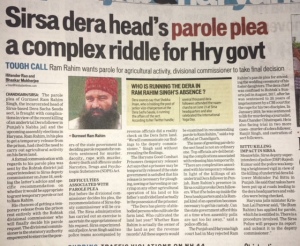First of all, let us know parole laws in India
In India grant of parole is given under the Prison Act, 1894 and Prisoner Act 1900 but states also has its own rules with minor alterations in the central Act.
Parole in most simple words is temporary release from jail before completion of the sentence term.
There are two kinds of parole:
- Custody parole- where convict will be released for few hours in the custody of police in extreme emergency cases like marriage, death in family, serious illness to family member etc.
- Regular parole- Where convict is left for a longer period maximum one month on valid grounds and report received from local police station.
Now the process to apply for Parole in Punjab and Haryana:
1 Application is forwarded to Jail Authorities for release on parole citing any of the below reasons:
Reasons of Parole
1 Agriculture or urgent maintenance of property
2 Marriage in family or delivery of child
3 Construction of house
4 Aailing parents or death in family
5 Any other unavoidable circumstances like natural calamity etc.
2 Then the plea is forwarded to DC/Local SDM for comments whether it would be appropriate to release prisoner on parole or not.
3 The DC office/SDM then seeks report from the local police station where prisoner resides and apprise the jail authorities with ground level situation. How likely is prisoner to return to jail after finishing parole.
4 Where jail authorities are not convinced, he/she may consult Inspect General of the Prison or prison department in state authority.
5 The maximum time undergone should be more than one year to apply for parole.
Section 5(A) and 5(B) of the Prison Act 1894 defines furlough and parole
Following people can’t apply for parole:
1 Offences against state
2 Threat to national security
3 Foreign nationals

If the Authorities decline the request without citing any valid and justified reason, then the aggrieved can reach to High Court for quick Redressal of their parole application.
The underlying object of the rules relating to ‘parole’ and ‘furlough’ are mentioned in the All India Jail Committee’s Report and the Model Prison Manual.
Difference between Furlough and Parole
The former is a right and the latter is not. Maximum 14 days furlough in a year and 30 days in a month on parole can be given to prisoner.
Parole and furlough are never prisoner’s right but based in situation it may be granted.
Manu Sharma convict in Jessica Lal case is the famous example of parole in India. Sometimes the jail authorities are not inclined to extend parole due to unavoidable circumstances. In that situation, you may approach Punjab and High Court for Parole Application for possibly for extension.
For more info, please dial 99888-17966.